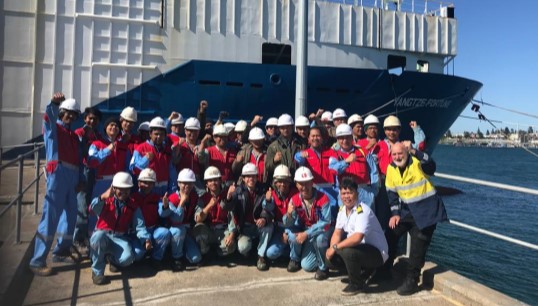- Topics
- Campaigning
- Careers
- Colleges
- Community
- Education and training
- Environment
- Equality
- Federation
- General secretary message
- Government
- Health and safety
- History
- Industrial
- International
- Law
- Members at work
- Nautilus news
- Nautilus partnerships
- Netherlands
- Open days
- Opinion
- Organising
- Podcasts from Nautilus
- Sponsored content
- Switzerland
- Technology
- Ukraine
- United Kingdom
- Welfare

The International Transport Workers' Federation and its inspectors get seafarers home when they are abandoned by unscrupulous employers, and fight for the pay the crew are owed. With a record number of cases last year, Rob Coston reports on two recent successes, both involving the same shipowner, which show the importance of port state cooperation
Soar Harmony Shipping Ltd is well known to the ITF. The Hong Kong-based shipowner has a long history of abandoning crew, and its vessels have been detained before for violating safety and crew welfare rules. Yet even the ITF did not expect it to abandon two crews at the same time.
Following the release of the 43 Filipino seafarers onboard the livestock ships Yangtze Harmony and Yangtze Fortune, the ITF has managed through its work to not only win freedom and flights home for the crews, but also recover more than USD $1 million in backpay for them.
A tale of two ships
Yangtze Harmony was arrested in October 2022 in Singapore over an unpaid fuel bill, at which point Soar stopped paying the entire crew, leaving them without wages or a way to get home. By April, they were owed a massive USD $429,972.
Meanwhile, the Yangtze Fortune, the Harmony's sister vessel, was seized by the Australian Federal Court at Portland, Victoria over the owner's refusal to make urgent repairs.
The crew of the Fortune turned out to be much more fortunate than their colleagues aboard the Harmony, however.
Assistance in Australia
Firstly, half the Fortune's crew went home in a matter of weeks because the ITF successfully lobbied to have the flag state reduce the ship's minimum manning levels from 30 to just 16. The ITF was able to make the case because the Fortune would not be leaving anchorage anytime soon, as Australian authorities required expensive repairs to the vessel.
The second major difference between the two crews' experience of abandonment comes down to support for, and adherence to, labour and human rights by the parties with obligations.
Authorities must realise they have a clear responsibility under international law to act swiftly in cases where crew welfare is in jeopardy. Steve Trowsdale, ITF inspectorate coordinator
In Australia, the crew of the Fortune did not have to endure months of uncertainty. Efforts were made to prevent legal wrangling from delaying the seafarers being paid and flown home. The Federal Marshal kept them updated on progress towards the ship's sale and provided options for them to consider, reiterating key information about their labour and human rights such as those under the Maritime Labour Convention (MLC). They knew how to access shore leave and medical care and were visited several times by local welfare and union representatives.
Slow pace in Singapore
Singapore's legal system, however, left the crew of the Yangtze Harmony in limbo.
While lawyers, insurers and bureaucrats slowly went through the process of selling the ship to pay its debts, the seafarers waited and waited. Unable to return to the Philippines or to earn money, their families struggled. Some fell into debt and in one case money ran out, leaving a seafarer's loved one unable to pay medical bills.
'It's a complex process in any jurisdiction when a shipowner defaults on payments,' says ITF inspectorate coordinator Steve Trowsdale. 'But authorities must realise they have a clear responsibility under international law to act swiftly in cases where crew welfare is in jeopardy.'
Singapore ratified the Maritime Labour Convention (MLC) in 2011. This specifies how cases of abandonment should be handled. Trowsdale argues that in delaying proceedings for more than five months, Singapore may have contravened the MLC.
Trowsdale said he was looking forward to the publishing of joint ILO-IMO guidelines authored by the ITF and shipowners' association ICS. The guidelines on how to deal with cases of seafarer abandonment are aimed at port states (in this case, Singapore and Australia), making clear that they should prioritise getting crew home before worrying about money matters.
They explain how port states can adhere to the provisions of the MLC through practical examples, such as replacing abandoned crew with a local team or putting the vessel in dry dock/shifting it to a guarded anchorage. These methods can reduce the number of seafarers required to stay onboard.
Mental health and welfare
The ITF's Flags of Convenience Campaign network coordinator for Asia Pacific, Sandra Bernal, worked for six months to get the 13 seafarers home and paid.
“The seafarers onboard the Yangtze Harmony were suffering from fatigue, anxiety and stress,' she says, adding that the contrast between the way authorities in Singapore and Australia handled the two abandonment cases showed how a port state's response to an abandonment can make a huge difference to the welfare and mental health impacts for affected crew.
If you suspect a ship has been abandoned, you should contact abandonment@itf.org.uk. The ITF will then log the incident in its database and report it to the International Maritime Organization.
Tags
